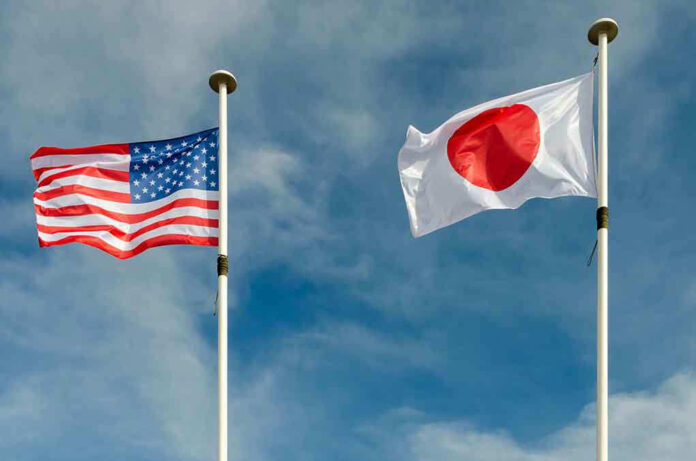
China’s threat of military force against Japan over Taiwan puts American allies on a collision course with Beijing, raising the stakes for U.S. security and global stability.
Story Snapshot
- China warns citizens against traveling to Japan and threatens military retaliation if Japan aids Taiwan.
- Japan’s new prime minister adopts a more assertive defense policy, signaling readiness to intervene in a Taiwan conflict.
- Escalation marks a dangerous shift in East Asian power dynamics, with global economic and security implications.
- Regional tensions surge as diplomatic channels falter and military posturing intensifies.
Japan’s Assertive Shift: A New Security Era in East Asia
Japan’s newly appointed Prime Minister Sanae Takaichi has upended decades of pacifist policy, declaring that a Chinese attack on Taiwan could trigger a Japanese military response. This break from past ambiguity signals a bold new era for the U.S.-Japan alliance and sends a clear message to Beijing that the era of unchecked Chinese aggression is over. Conservatives see this as long overdue, given years of Chinese expansionism and threats to democratic allies across the Pacific.
China’s reaction was swift and hostile. Beijing issued an official travel warning, urging its citizens to avoid Japan, while Foreign Ministry spokesperson Lin Jian threatened “forceful” military retaliation if Japan intervenes in any Taiwan conflict. Chinese officials, including the consul general in Osaka, have echoed these warnings, raising fears of a direct military confrontation. Japan responded by lodging a formal diplomatic protest, and lawmakers are now debating even stronger measures, including the possibility of hosting U.S. nuclear weapons as a deterrent.
Mounting Tensions: Diplomatic Breakdown and Regional Risks
Diplomatic relations between China and Japan have plummeted to new lows. Both nations have exchanged sharp rhetoric, with each accusing the other of undermining regional security. The use of travel advisories as diplomatic weapons demonstrates how quickly an international dispute can escalate into a broader crisis. These developments unfold against the backdrop of recent Chinese military exercises near Taiwan and Japan, including missile launches that have landed in Japanese waters.
The stakes are high, with the “Davidson window” (2024–2028) seen by defense analysts as the most dangerous period for a Chinese move against Taiwan. Japan’s 2015 security laws now permit military action if an “existential crisis” threatens national survival—a threshold Prime Minister Takaichi argues a Chinese attack on Taiwan would meet. This more assertive posture raises both the risks of conflict and the chances of deterring Beijing, depending on how events play out.
Global Consequences: Economic Fallout and Security Dilemmas
The crisis has immediate and far-reaching consequences. Disrupted travel and economic ties between China and Japan threaten both nations’ citizens and the broader region. A downturn in tourism and trade could ripple through already fragile global supply chains, especially in technology and manufacturing. Nationalist sentiment is rising in both countries, with leaders facing pressure to adopt ever-more hardline positions. For American conservatives, this episode is a stark reminder that appeasement and weakness only embolden rivals who threaten freedom, prosperity, and U.S. interests abroad.
Security analysts estimate there is a significant risk of limited conflict—such as a blockade or military standoff—if current trends continue. While some experts caution that a full-scale invasion remains unlikely due to the high costs for China, the risk of miscalculation is climbing. The crisis underscores the need for a strong, well-armed allied coalition, united by shared values and the willingness to stand up to authoritarian threats. For supporters of constitutional government, national defense, and traditional values, these developments highlight why American resolve and leadership remain essential in a dangerous world.
Expert Analysis: The Road Ahead for U.S. and Allies
Industry experts agree that Japan’s new defense posture marks a historic pivot, with the potential to strengthen regional deterrence but also to increase the risk of escalation. Western analysts emphasize the importance of alliance coordination and clear communication to prevent a slide into open conflict. Meanwhile, Chinese sources insist that Japan has no legal or moral right to intervene in Taiwan, framing Tokyo’s new stance as an act of aggression. This fundamental disagreement reveals deep-seated mistrust and the limits of diplomacy with authoritarian regimes.
China tells citizens not to visit Japan and threatens military response as Taiwan row escalates – https://t.co/5jKWHbHvaR #GoogleAlerts
— MOIZ ESUFALLY (@moizesufally) November 16, 2025
The U.S., under President Trump, has signaled unwavering support for allies like Japan and Taiwan, recognizing that a strong defense of liberty abroad protects America’s interests at home. As China continues to test the resolve of its neighbors, the world watches for decisive leadership and principled action that will determine the future of freedom in the Indo-Pacific region. The outcome of this crisis will set the tone for global security and the defense of constitutional values for years to come.
Sources:
Will China Invade Taiwan? | Global Guardian
Taiwan-China: The Looming Threat of War | TIME
Confrontation Over Taiwan | Council on Foreign Relations












